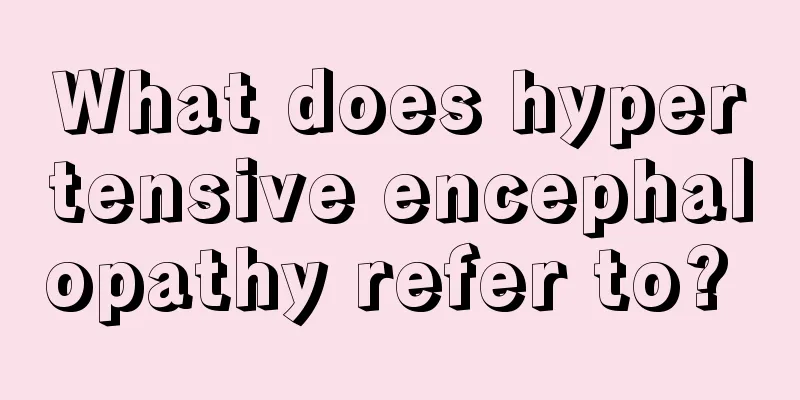What does hypertensive encephalopathy refer to?

|
Hypertensive encephalopathy mainly refers to a series of adverse symptoms caused by a sudden increase in blood pressure that exceeds the range of automatic regulation of cerebral blood flow, such as temporary cerebral circulation disorders. The causes of hypertensive encephalopathy include primary hypertension or secondary hypertension. Hypertensive encephalopathy refers to a series of clinical manifestations of temporary cerebral circulatory dysfunction caused by a sudden increase in blood pressure that exceeds the threshold of cerebral blood flow autoregulation (central aortic pressure greater than 140 mmHg), resulting in hyperperfusion of cerebral blood flow, excessive capillary pressure, and increased permeability, leading to cerebral edema and increased intracranial pressure, and even the formation of brain herniation. 1. Essential hypertension The incidence of hypertensive encephalopathy is about 1% among patients with primary hypertension. It is more likely to occur in those with a long history of hypertension and obvious cerebral vascular sclerosis. It may also occur in patients who previously had normal blood pressure but suddenly develop hypertension, such as patients with rapid hypertension and acute glomerulonephritis. Hypertensive patients with renal failure are also prone to hypertensive encephalopathy. 2. Secondary hypertension Secondary hypertension such as hypertensive disorder complicating pregnancy, glomerulonephritis-related hypertension, renal artery stenosis, and pheochromocytoma are prone to hypertensive encephalopathy. 3. Certain drugs or foods induce hypertensive encephalopathy Rarely, patients with hypertension who take monoamine oxidase inhibitors while also taking rauwolfia, methyldopa, or postganglionic sympathetic inhibitors may develop symptoms similar to those of hypertensive encephalopathy. Eating foods rich in amines can also induce hypertensive encephalopathy. 4. After carotid endarterectomy After carotid endarterectomy in patients with severe carotid stenosis, a sudden increase in cerebral perfusion can also cause hypertensive encephalopathy. Hypertension is a very harmful disease. Patients mainly rely on long-term antihypertensive drugs and daily diet to control it, but patients still need to pay attention to avoid the occurrence of various complications. |
<<: What should I do if I have thick white tongue coating and bad breath?
>>: Can pneumoconiosis be cured? Treatment principles to know
Recommend
What is the reason for sunken lower eye sockets? What to do if the lower eye sockets are sunken
It is said that eyes are the embodiment of a pers...
How long can you live with lung cancer metastasis? Affected by many factors
The survival time of patients after lung cancer m...
Is there a cure for thalamic glioma?
Glioma is the most common malignant tumor in the ...
What should lung cancer patients pay attention to in their lives? Pay attention to these four points
The appearance of lung cancer patients themselves...
Can burns heal if the skin turns white?
In fact, the structure of human skin is quite com...
What are the surgical treatments for lung cancer?
Surgical treatment is the first choice and the mo...
Does walking help you exercise?
Maybe each of us walks a lot every day. In fact, ...
What are the benefits of vitamin B
It is well known that vitamin B belongs to a grou...
Be careful of summer heat in autumn
We know that it is easy to get heatstroke in summ...
Beware of several symptoms of bladder cancer
Bladder cancer is a disease that has a terrible i...
What are the menstrual manifestations of endometrial cancer?
The menstrual manifestations of endometrial cance...
Urinary tract stone pain, how to treat
The development of modern industry has not only a...
How to use hairpins
Every woman wants to have a beautiful hairstyle, ...
What's wrong with sleepy eyes
Many times people don’t understand what is happen...
The important role of zinc supplementation, expectant mothers should pay attention to it
Zinc is an important element needed by the human ...









